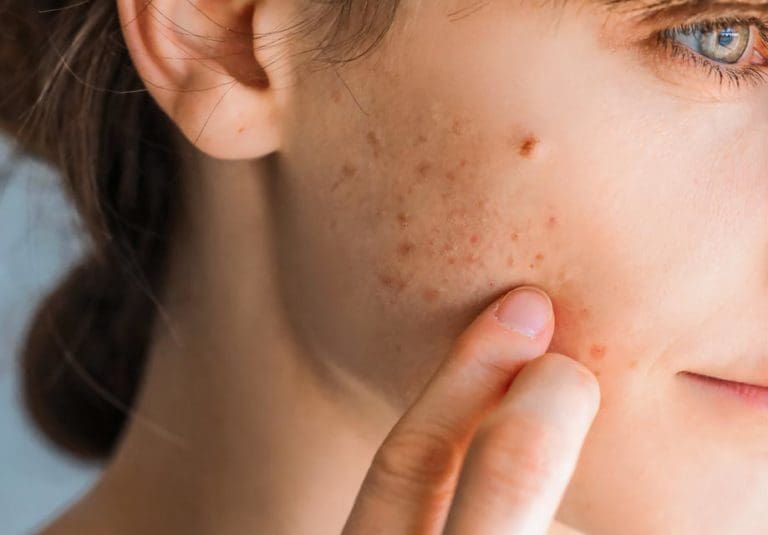
Acne is a common skin condition that affects millions of people worldwide, yet it remains misunderstood by many. From teenagers to adults, acne can impact anyone, regardless of age, gender or ethnicity. Effectively managing and treating this condition often relies on understanding the concern and its causes; something the team at Face Medical do really well.
Understanding acne.
Acne is a skin condition that occurs when hair follicles become clogged with oil and dead skin cells. This results in the formation of pimples, blackheads, whiteheads, and sometimes deeper cysts or nodules. Common places for these blemishes to form include the face, neck, shoulders, chest and upper back, areas where oil glands are most prevalent.
Several factors can contribute to the development of acne, including: hormonal changes, genetics, bacteria, and certain medications. Hormonal fluctuations, particularly during puberty, menstruation, pregnancy and menopause can increase oil production. This will then lead to congested pores and a breakout of acne.
Who can be affected?
Although it’s a common belief, acne isn’t limited to teenagers. While it often begins during adolescence due to hormonal changes, it can persist into adulthood and even develop for the first time in later life. Adults (both men and women) can experience acne well into their 30’s, 40’s, and beyond.
Also, acne doesn’t discriminate based on skin type or ethnicity. People with oily skin may be more prone to acne due to increased oil production, but individuals with dry or combination skin can also experience breakouts. People of all ethnic backgrounds can develop this concern, although it may manifest differently in various skin tones.
Common myths about causes and treatments of acne.
MYTH 1 – Eating greasy foods causes acne!
While diet can influence overall skin health, there’s little evidence to support the idea that certain foods, such as pizza or chocolate, are a direct cause of acne. However, a well-balanced diet, rich in fruits, vegetables and whole grains can generally support healthy skin.
MYTH 2 – Sun exposure clears acne.
Sun exposure can initially dry out the skin and temporarily improve acne, but prolonged sun exposure can lead to increased oil production and inflammation. Over time, this can exacerbate the concern. In addition, failing to adequately protect the skin when exposing it to the sun (lack of SPF) can cause long-term skin damage, and may also increase the risk of skin cancer.
MYTH 3 – Popping pimples helps them heal faster.
Picking or squeezing spots can actually worsen inflammation, increase the risk of acne scarring, and spread bacteria – which can lead to further breakouts. Face Medical’s trained skincare specialists advise all those who experience infrequent spots, or regular breakouts, to leave spots alone or seek professional skincare advice to avoid further skin damage.
Treating acne with ZO Skin Health.
Face Medical stocks ZO Skin Health, a global skincare range renowned for providing advanced skincare solutions. ZO’s comprehensive protocol for treating acne addresses its root causes and provides an effective solution for clearer, healthier skin. This protocol includes:
Cleansing – gentle yet effective cleansers remove impurities, excess oil and make-up without stripping the skin’s natural moisture barrier.
Exfoliation – exfoliating products help unclog pores, remove dead skin cells and promote cell turnover, revealing smoother, brighter skin.
Treatment – targeted treatments containing ingredients such as benzoyl peroxide, salicylic acid and retinoids help reduce inflammation, destroy acne-causing bacteria and prevent future breakouts.
Hydration – oil-free moisturisers hydrate the skin without clogging pores, maintaining the right moisture balance and preventing dryness.
Sun protection – broad spectrum sunscreens protect the skin from harmful UV rays, preventing sun damage and minimising the risk of post-inflammatory hyperpigmentation.
By following a customised skincare protocol for acne, you can take control of your skin and enjoy a smoother, clearer, healthier complexion.
